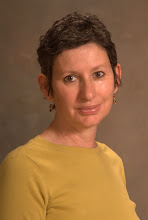 unty bandanna around her neck. At the risk of sounding anthropomorphic, I think she likes accessorizing. She doesn't scratch or pull at the bandanna. When you take the scarf off, Zephyr barks vigorously and only quiets down when you put it back around her neck.
unty bandanna around her neck. At the risk of sounding anthropomorphic, I think she likes accessorizing. She doesn't scratch or pull at the bandanna. When you take the scarf off, Zephyr barks vigorously and only quiets down when you put it back around her neck. Usually, these little dog scarves are cut out of "seasonal" fabrics. In July, the groomers dress her in a flag pattern. In April, she may come home wearing bunnies or chicks. After a few years of this, I just couldn't hold my tongue any longer. One day when we got home from the groomers, I asked her straight out, "Do you like being dressed like an elementary school teacher?" She sniffed back at me and left the room. Clearly, I had gone too far. But undeterred, I went out the next day and bought her a traditional hippie-style bandanna in a nice shade of blue. Now, when she comes home from the groomers, I take off the seasonal garb, and she wears the blue bandanna for a while.
The other day, I was looking around the house for something that could cover my nearly bald head, and I spied the dog's scarf in a pile of clean laundry. These being desperate times, I asked her, "Zephyr, can I borrow this?" She said, "Yeah, go ahead. It's not my best color." Although I was a little taken aback because she had never once complained about the shade, I tied her bandanna around my head. We both agreed that it looked better on me than on her. Later, she confided that she preferred the scarves with the pumpkins and the candy canes.
Believe what you will, but I truly have sunk to wearing my dog's neck-ware as headgear. Along these same lines, if I dig deeply enough into my closets, I may be able to find those old Boy Scout scarves that my kids cast off long ago and recycle them as head coverings. For the record, I'm drawing the line at borrowing Zephyr's bunny scarf. She's a very loyal dog, and I'm sure that she'd loan it to me if asked her. But with spring just around the corner, she'll probably want to wear it herself.





